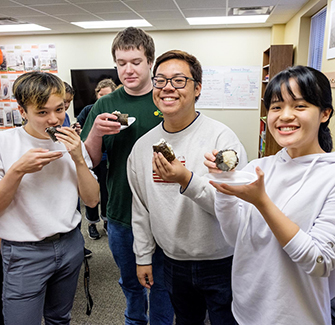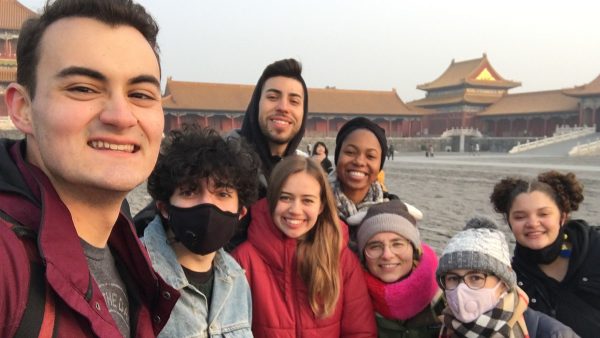
Why Study Chinese at K?
Immersive study abroad opportunities, small class sizes, and engaging courses make K an excellent school to study Chinese.
Housed within the East Asian Studies Department, The Chinese minor exposes you to the language, literature, and culture of historical and modern China. By looking at Chinese literature and other cultural products through historical, social and political lenses, you will gain a sense of China’s global influence.
Your studies will be split between Chinese language classes—from beginner to advanced—and Chinese culture courses taught in English, such as Women in China, China from the Borders, Chinese Sci-Fi, and The Past in Contemporary China.
You are encouraged to apply your studies and take advantage of K’s renowned study abroad program, with opportunities to live in Hong Kong, Beijing, Shanghai, Harbin and Taiwan, for three to nine months.
Your in-depth studies will prepare you with tangible language, global awareness, and critical thinking skills to jumpstart your post-K career. Our alumni have leveraged their Chinese minor in international relations, education, and business careers—many of whom choose to live and work in China.
Note: Students can only Minor in Chinese; if they choose to continue their studies, they can major in East Asian Studies. However, due to the significant overlap in their programs, a student cannot major in East Asian Studies and minor in Chinese or Japanese.
What can you do with a Chinese minor?
Below are some of the careers, employers, and graduate schools of our Chinese alumni.
Careers
- English/Chinese Teacher
- Software Engineer
- Attorney
Employers
- Fulbright
- IBM
- University of Michigan
Graduate Schools
- Capital Normal University, Beijing
- John Hopkins University
- George Washington University
Program Spotlights

Experience the Breadth of Chinese Culture by Studying Abroad
While you may choose from any of the College’s 50+ study abroad programs, Chinese minors can advance their studies through five study abroad offerings—for two to three terms—in Hong Kong, Beijing, Shanghai, Harbin, or Taiwan. These five distinct cities represent the diversity of modern-day China: Explore the capital and all of its rich history in Beijing, live in the Special Administrative Region of Hong Kong, take advantage of all Shanghai has to offer, experience the world-famous Ice Festival in Harbin, or visit the National Palace Museum in Taiwan.
Celebrate the Lunar New Year
the students with whom you advance through your courses and the professors who go out of their way to offer personalized mentorship. This camaraderie is exemplified by the department’s annual Lunar New Year celebration, where everyone comes together to usher in a year of happiness and prosperity through an evening filled with food, music and conversation.

Meet the Current Departmental Student Advisor
What is the best thing about being part of this department?
I’ve loved being able to chat with professors during office hours to enhance my speaking skills.
How have you taken advantage of the open curriculum or experienced breadth in your education?
I’ve gotten involved in Chinese as well as history classes in addition to a pretty heavy STEM load.
What is your Senior Integrated Project [SIP]?
My SIP is in Chemistry synthesizing heterobimetallic catalysts for the deoxy dehydration of polyols.
What are your career aspirations/next steps after K?
I am hoping to go to graduate school for chemistry.


